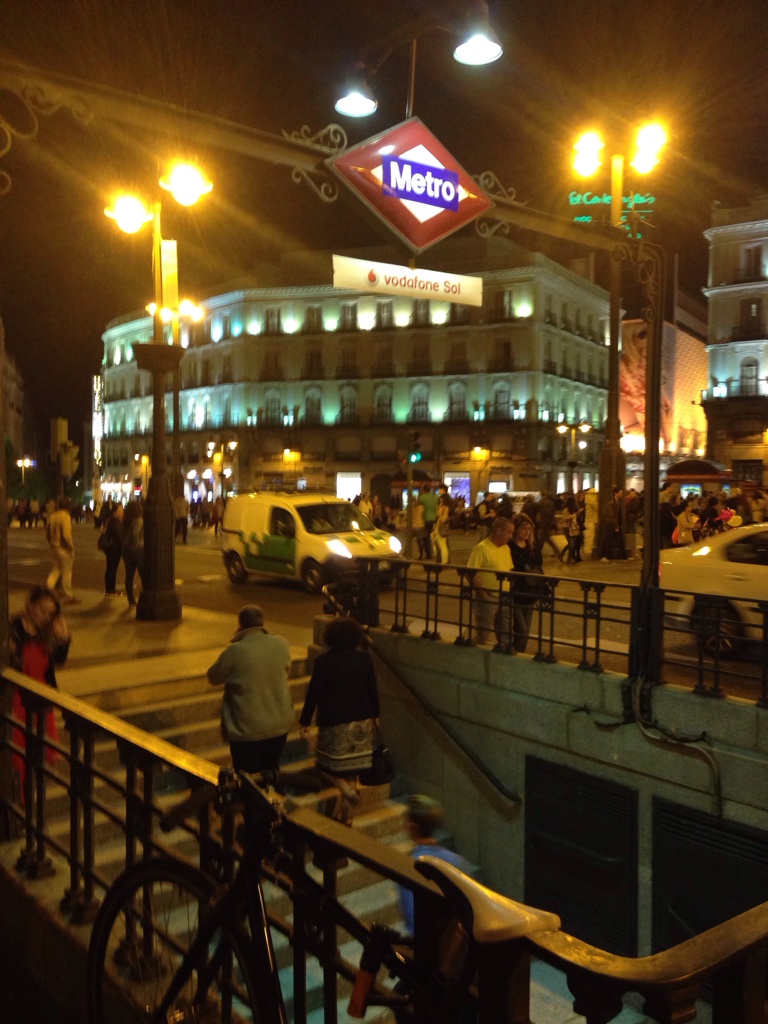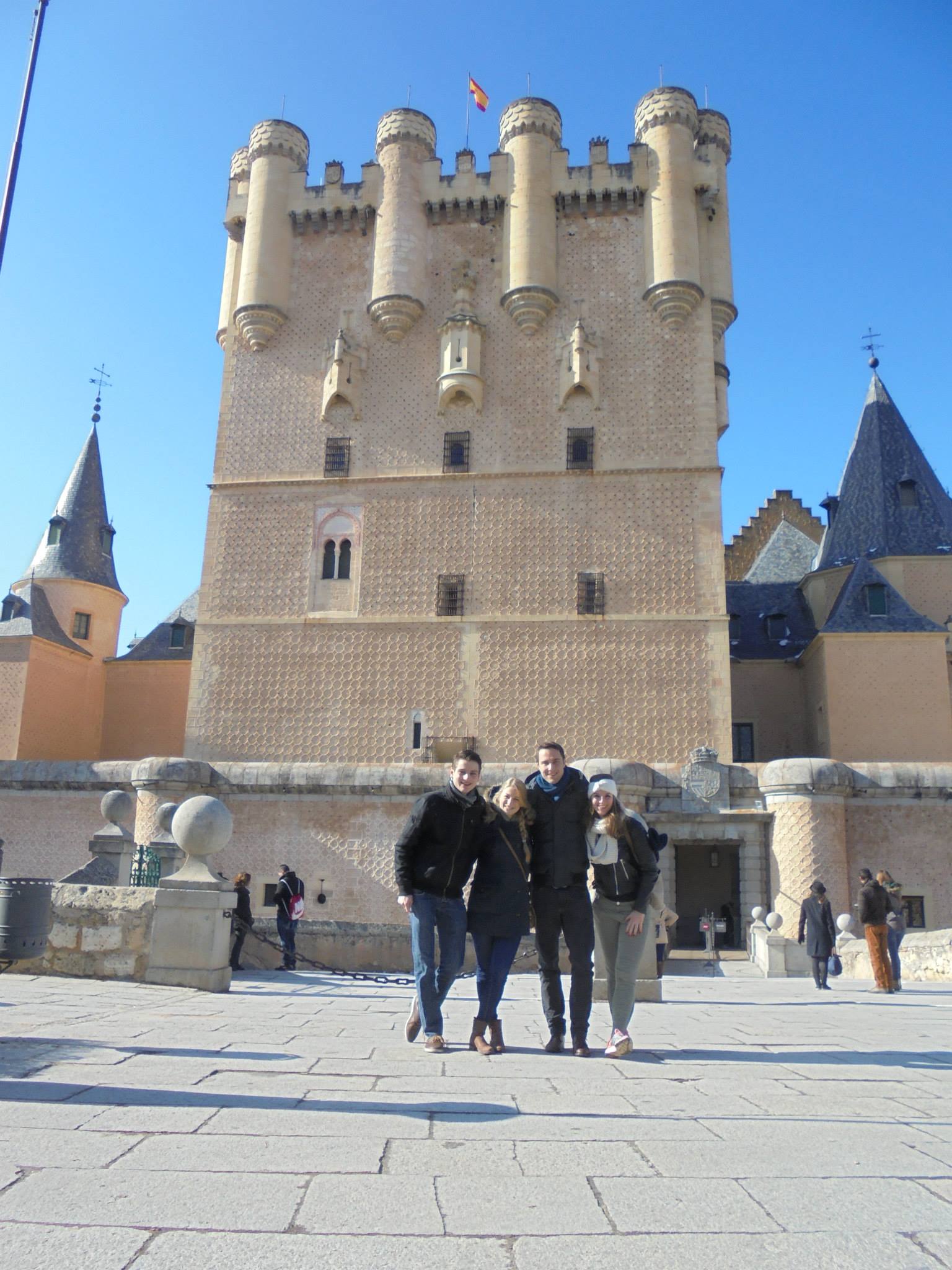The canteen and the coffee in the foyer of the Faculty building I missed a lot. Every Faculty at Complutense has a cafeteria, but often there is only one meal on offer: either something fried or hamburgers. The coffee sold in the foyer of the “WiSo” Faculty in Cologne and the matching cup would be seen as pure luxury there. In any case, student life does not take place on campus so much – most students only come for their lectures and don’t stay to study in the library, have lunch with friends or just hang out on campus.
Photo: Barbara Wehrheim
Barbara Wehrheim is majoring in business administration. During the summer term of 2015 she spent a semester at the Unversidad Complutense de Madrid in the framework of the STAP exchange program. She offers important tips on cultural differences and how to prepare for your time abroad.
After learning Spanish at school and spending some time in Spanish and English-speaking countries, I wanted to take the opportunity to improve my language skills in an exchange program abroad. In the summer semester, the choice of universities in Spanish-speaking countries was rather limited. After long consideration, I applied for exchange programs in Madrid. I was very interested in Universidad Complutense from the very beginning because it is a very well-known university and many courses are offered in Spanish and English. That is why it was the first of my five preferences.
Good preparation is essential
The preparation phase was very well organized by the International Relations Center, which made it easy for me. In my third semester (late May 2014), I applied through the IRC to go abroad in my fifth semester. After confirmation, I also had to fill out an online application and some other documents for the university in Madrid. The Erasmus coordinators at the Complutense were always very nice and helped me with all my questions and problems. It is a good idea to fill out the Erasmus documents as early as possible and have them signed by all involved parties. But that’s easy to get done.
Course selection, credit recognition and student life
You are pretty much on your own in selecting courses, especially if there is no list of partner university courses that have been recognized in the past – like in my case. However, you can apply for the recognition of courses in advance to get an impression of the kinds of courses that are accepted. One of my Business Administration courses was rejected, but an Economics course was recognized without problems. That’s why I took the Economics course “International Economics” in English and two other Business Administration courses in Spanish. They were then recognized as 12 points in the “Profilgruppe” International Management. In addition, I took six hours of Spanish lessons per week. Even if you take many courses in Spanish, I would recommend that you also take a language course. They are often quite affordable and help you improve your speaking and writing skills. The University of Cologne requires 20 credits, and if you take your courses in Spanish, this is quite a workload, since you often have to do homework and group work or give presentations. Spanish students and professors are always really helpful and appreciate it if an exchange student makes an effort in the language. Grades are rather generous and don’t take into consideration the student’s (insufficient) language skills. Moreover, attendance is usually mandatory because the system is highly structured and many professors don’t upload their presentations. With 40 course participants, among them one exchange student, unfortunately one’s absence does not go unnoticed! Exams are often announced quite short-term, or one has to give a five minute presentation at the blackboard and then gets a grade. Also, quite a few people are not very punctual, but one should be careful because it can happen that the professor will personally address you if you arrive late or leave early.
Public transports is rather Mediterranean
Sometimes there are delays because there is no precise metro timetable and people line up at the bus stop. Even if they have a tight schedule, Spaniards sometimes wait for the next bus in order to get a seat. For students up to the age of 23, a metro card for the Faculty of Economics in Somosaguas costs 39 euros per month. The regular price is 65 euros. The Faculty is located outside the city, approximately 40 minutes from the city center. But this is the case with all universities. In light of the distance, it’s necessary to buy the ticket.
Recreation in Madrid
There are many different Erasmus organizations in Madrid that organize parties, cultural events or short, low-budget trips. However, there is nothing like the sort of personal support you receive at the Pim and Cems Club of the Faculty of Management, Economics and Social Sciences in Cologne. But Madrid has a lot to offer culturally, and students can often visit museums and exhibitions at a reduced price. Moreover, there are many great parks. Directly outside the city there is a huge city park where you can go for a jog or a bike ride if the weather is good – which is almost always the case. Trains and buses connect Madrid to other interesting smaller cities like the student town Salamanca or culturally attractive cities like Toledo and Segovia
Life in the Auberge Espagnole
Although almost all universities are located outside the city and I had a 45 minute train ride to my Faculty, I would encourage everyone to live in the city center. I went to Madrid in January, before the beginning of the semester, to look for a place to live. A Spanish Erasmus student from Madrid, whom I met in Cologne in the framework of the Buddy Program, took me in at first. The Buddy Program offers you the opportunity to meet nice, open-minded people from all over the world. With a little luck, they can help you get settled in. Accommodations can easily be found on the Website “Idealista”, sometimes with other Erasmus students, or with Spaniards. However, Spanish students tend to live at home with their parents for a long time and many simply cannot afford to live in the city center. You can also find very large communal apartments where up to 12 people live. That sounds like a lot, but I can say first-hand that it is a great experience and that it never gets boring. Madrid has very beautiful old buildings and beautiful, atmospheric barrios in the center, like La Latina, Sol, Huertas, Malasana, Chueca or Tribunal, with many cafes, markets and bars. Life takes place on the streets, and even at night, the quarters in the city center are very much alive. So it’s no problem to walk home at night. Unfortunately, the metro only runs until 1:30 a.m. – even on weekends.
Coming from Cologne, what did I miss at the Complutense?
My conclusion for my stay
Madrid is a very lively city for young people with an impressive culture and recreation offer. You should be able to speak some Spanish before going there – it makes it easier to adjust and you profit more from your experience. The UoC offers Spanish courses in the studium integrale, but there are also outside offers for more intensive language training.
Don’t only take courses offered in English! All Economics and Business Administration courses are offered in English or “Spanglish”, but I can only advise you not to be intimidated by courses in Spanish. You will understand more in time and professors are very understanding. Every beginning is difficult!
Take every opportunity: even if you don’t get your first preference – there are many other countries that are super-interesting. And a semester abroad is interesting and a lot of fun in any case. Also, it doesn’t always have to be the USA or Canada, it can also be “plain old” Spain. It’s important what you make of it!

